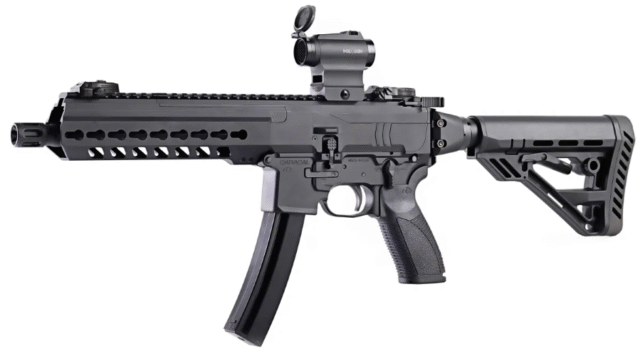In a major development that highlights the growing defence partnership between India and the United Arab Emirates (UAE), CARACAL, an Abu Dhabi-based small arms manufacturer and a subsidiary of the EDGE Group, has announced the start of full-scale production of rifles and light ammunition in India. This move comes through a strategic collaboration with ICOMM Tele Ltd, a subsidiary of Megha Engineering & Infrastructures Ltd (MEIL), and marks the first-ever defence Technology Transfer (ToT) from the UAE to India.
In an exclusive interview with BharatShakti during the ongoing Milipol India event in New Delhi, CARACAL CEO Hamad Salem Al Ameri announced the forays into India. He described the company as the “Tesla of the gun business.” He stated, “This initiative is designed to accelerate our efforts compared to small arms production.”
Al Ameri emphasized, “We have gained valuable insights from our collaborations and operations in India. With this expertise and our established partnerships, we are confident that we can quickly ramp up light ammunition manufacturing to meet local and regional demands.”
Manufacturing Hub in Hyderabad
Production will be carried out at ICOMM’s Integrated Engineering Complex in Hyderabad, which is set to become a strategic manufacturing base for CARACAL’s advanced small arms. The facility will produce a range of weapon systems—including close-quarter battle rifles, sniper systems, and submachine guns—to cater to the Indian Armed Forces, Central Armed Police Forces (CAPFs), State Police Forces, Special Forces, and export markets.
‘Make in India’ Product Line-Up
Under this joint initiative, the product range includes:
- CAR 816: 5.56x45mm NATO CQB rifle
- CAR 817: 7.62x51mm NATO assault rifle
- CSR 338 & CSR 308: Bolt-action sniper rifles (.338 Lapua Magnum and .308 Winchester)
- CSR 50: 12.7x99mm NATO anti-materiel sniper rifle
- CMP9: 9x19mm compact submachine gun
- CARACAL EF & F GEN II: 9x19mm combat pistols
Accelerated Ammunition Production
CARACAL is also fast-tracking the local production of light ammunition in India across key calibres—9mm, 5.56mm, 7.62mm, and 12.7mm—further deepening its commitment to the Indian market.
“This is progressing faster than small arms production,” said Al Ameri, adding, “Our experience in India has equipped us to move swiftly. We’re confident in scaling up ammunition manufacturing to meet domestic and regional needs.”
Strengthening Strategic Ties
Beyond commercial interests, this venture symbolizes the deepening strategic defence relationship between India and the UAE. India’s flagship policies, such as ‘Make in India’ and ‘Atmanirbhar Bharat,’ have played a pivotal role in attracting foreign OEMs to invest in local production and technology transfer.
“This collaboration is proof that with the right ambition and support, defence manufacturing in India isn’t just possible—it’s successful,” Al Ameri said. “While many firms hesitate due to perceived challenges, we’ve demonstrated that it can be done—and done well.”
Global Ambitions
CARACAL has an established presence in Europe, North Africa, and Southeast Asia. With existing production bases in Germany and the US, new facilities in India, and expansion plans into Africa and Malaysia, the company is positioning itself as a formidable global player in the small arms industry.
“We’re constantly innovating—lighter materials, higher accuracy, more modularity. We don’t just sell guns; we deliver mission-specific solutions,” Al Ameri noted, likening CARACAL’s disruptive approach to that of a tech innovator: “We’re becoming the Tesla of the gun business.”
Looking Ahead
As operations scale up in Hyderabad, CARACAL and ICOMM also lay the groundwork for ammunition production, including raw material sourcing, demand forecasting, and cost optimization. At the same time, the company is exploring partnerships with Indian optics firms such as MKU to offer fully integrated, customizable weapon systems.
With a collaborative mindset—even toward potential competitors—CARACAL embraces a modern, decentralized, and innovation-driven defence manufacturing strategy. It reflects a broader global shift toward local production, co-development, and technology sharing.
This venture not only underscores India’s rise as a global defence manufacturing hub but also highlights the growing confidence of international firms in India’s industrial capabilities and policy environment.
Huma Siddiqui









